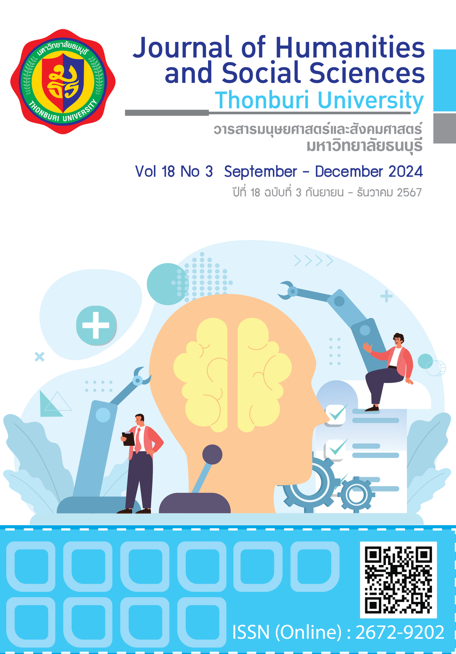อิทธิพลของปัญญาประดิษฐ์และการเรียนรู้ของเครื่องที่มีต่อภูมิทัศน์ของธุรกิจแพลตฟอร์ม
คำสำคัญ:
เอไอ, ปัญญาประดิษฐ์, การเรียนรู้ของเครื่อง, แมชชีนเลินนิง, แพลตฟอร์มบทคัดย่อ
งานวิจัยนี้ มีวัตถุประสงค์การวิจัยเพื่อศึกษาอิทธิพลของปัญญาประดิษฐ์และการเรียนรู้ของเครื่องที่มีต่อภูมิทัศน์ของธุรกิจแพลตฟอร์ม เป็นการวิจัยเชิงคุณภาพ โดยใช้วิธีการวิเคราะห์เนื้อหาร่วมกับการสังเกตการณ์ทั้งที่มีส่วนร่วมและไม่มีส่วนร่วม ขอบเขตการศึกษาคือแพลตฟอร์มธุรกิจที่ดำเนินการใช้ระบบปัญญาประดิษฐ์และการเรียนรู้ของเครื่องบนแพลตฟอร์มทั้งภายในประเทศและต่างประเทศ เลือกกลุ่มตัวอย่างเพื่อเป็นกรณีศึกษาแบบเจาะจงตามปรากฏการณ์ของคำถามวิจัยที่ต้องการจะหาคำตอบจำนวน 150 รายการ มีการทบทวนอย่างเป็นระบบ เพื่อให้แน่ใจว่าแพลตฟอร์มนั้นๆ เกี่ยวข้องกับสิ่งที่กำลังศึกษา ใช้แบบบันทึกข้อมูล เครื่องมือวิจัยคำหลัก และระบบจัดการเนื้อหาเป็นเครื่องมือวิจัย นำข้อมูลที่ได้มาวิเคราะห์ร่วมกัน ด้วยวิธีการวิเคราะห์แบบอุปนัยผนวกกับการวิเคราะห์โดยการเปรียบเทียบเหตุการณ์ ตรวจสอบความน่าเชื่อถือของข้อมูล ด้วยวิธีการตรวจสอบแบบสามเส้า ปรากฏข้อค้นพบเป็นไปในทิศทางเดียวกัน ผลการวิจัย ปรากฏว่าปัญญาประดิษฐ์และการเรียนรู้ของเครื่องมีอิทธิพลต่อภูมิทัศน์ของธุรกิจแพลตฟอร์ม ดังนี้ 1) การตัดสินใจที่ขับเคลื่อนด้วยข้อมูล 2) การปรับเปลี่ยนในแบบเฉพาะบุคคล 3) การจับคู่ที่มีประสิทธิภาพ 4) ระบบอัตโนมัติและการเพิ่มประสิทธิภาพ 5) การตรวจจับการฉ้อโกงและความปลอดภัย 6) การวิเคราะห์เชิงคาดการณ์ 7) ประสบการณ์ผู้ใช้ที่ได้รับการปรับปรุง 8) โมเดลธุรกิจใหม่ 9) การเปลี่ยนแปลงของตลาด และ 10) ความท้าทายด้านกฎระเบียบ
เอกสารอ้างอิง
Alam, A., & Mohanty, A. (2022). Business models, business strategies, and innovations in EdTech companies: integration of learning analytics and artificial intelligence in higher education. 2022 IEEE 6th Conference on Information and Communication Technology (CICT),
Battisti, S., Agarwal, N., & Brem, A. (2022). Creating new tech entrepreneurs with digital platforms: Meta-organizations for shared value in data-driven retail ecosystems. Technological Forecasting and Social Change, 175, 121392.
Bharadiya, J. P. (2023). Machine learning and AI in business intelligence: Trends and opportunities. International Journal of Computer (IJC), 48(1), 123-134.
Bhardwaj, A., & Kaushik, K. (2022). Predictive analytics-based cybersecurity framework for cloud infrastructure. International Journal of Cloud Applications and Computing (IJCAC), 12(1), 1-20.
Bhutoria, A. (2022). Personalized education and artificial intelligence in the United States, China, and India: A systematic review using a human-in-the-loop model. Computers and Education: Artificial Intelligence, 3, 100068.
Chen, Y., Prentice, C., Weaven, S., & Hsiao, A. (2022). A systematic literature review of AI in the sharing economy. Journal of Global Scholars of Marketing Science, 32(3), 434-451.
Dhamange, P., Soni, S., Sridhar, V., & Rao, S. (2022). Market dynamics and regulation of a crowd-sourced AI marketplace. IEEE Access, 10, 54325-54335.
Fui-Hoon Nah, F., Zheng, R., Cai, J., Siau, K., & Chen, L. (2023). Generative AI and ChatGPT: Applications, challenges, and AI-human collaboration. In (Vol. 25, pp. 277-304): Taylor & Francis.
Haleem, A., Javaid, M., Qadri, M. A., Singh, R. P., & Suman, R. (2022). Artificial intelligence (AI) applications for marketing: A literature-based study. International Journal of Intelligent Networks, 3(2022), 119-132.
Himeur, Y., Elnour, M., Fadli, F., Meskin, N., Petri, I., Rezgui, Y., Bensaali, F., & Amira, A. (2023). AI-big data analytics for building automation and management systems: a survey, actual challenges and future perspectives. Artificial Intelligence Review, 56(6), 4929-5021.
Islam, M. U., & Chaudhry, B. M. (2022). A Framework to Enhance User Experience of Older Adults With Speech-Based Intelligent Personal Assistants. IEEE Access, 11, 16683-16699.
Ivanenkov, Y. A., Polykovskiy, D., Bezrukov, D., Zagribelnyy, B., Aladinskiy, V., Kamya, P., Aliper, A., Ren, F., & Zhavoronkov, A. (2023). Chemistry42: an AI-Driven platform for molecular design and optimization. Journal of Chemical Information and Modeling, 63(3), 695-701.
Kapadiya, K., Patel, U., Gupta, R., Alshehri, M. D., Tanwar, S., Sharma, G., & Bokoro, P. N. (2022). Blockchain and AI-Empowered Healthcare Insurance Fraud Detection: An Analysis, Architecture, and Future Prospects. IEEE Access, 10, 79606-79627.
Khang, A., Abdullayev, V., Jadhav, B., Gupta, S. K., & Morris, G. (2023). AI-Centric Modeling and Analytics: Concepts, Technologies, and Applications. CRC Press.
Krakowski, S., Luger, J., & Raisch, S. (2023). Artificial intelligence and the changing sources of competitive advantage. Strategic Management Journal, 44(6), 1425-1452.
Kulkov, I. (2023). Next-generation business models for artificial intelligence start-ups in the healthcare industry. International Journal of Entrepreneurial Behavior & Research, 29(4), 860-885.
Kunduru, A. R. (2023a). Artificial intelligence advantages in cloud Fintech application security. Central Asian Journal of Mathematical Theory and Computer Sciences, 4(8), 48-53.
Kunduru, A. R. (2023b). Cloud BPM Application (Appian) Robotic Process Automation Capabilities. Asian Journal of Research in Computer Science, 16(3), 267-280.
Kunduru, A. R. (2023c). From Data Entry to Intelligence: Artificial Intelligence’s Impact on Financial System Workflows. International Journal on Orange Technologies, 5(8), 38-45.
Liang, W., Tadesse, G. A., Ho, D., Fei-Fei, L., Zaharia, M., Zhang, C., & Zou, J. (2022). Advances, challenges and opportunities in creating data for trustworthy AI. Nature Machine Intelligence, 4(8), 669-677.
Narsimha, B., Raghavendran, C. V., Rajyalakshmi, P., Reddy, G. K., Bhargavi, M., & Naresh, P. (2022). Cyber Defense in the Age of Artificial Intelligence and Machine Learning for Financial Fraud Detection Application. IJEER, 10(2), 87-92.
Olaniyi, O., Okunleye, O. J., & Olabanji, S. O. (2023). Advancing data-driven decision-making in smart cities through big data analytics: A comprehensive review of existing literature. Current Journal of Applied Science and Technology, 42(25), 10-18.
Pallathadka, H., Ramirez-Asis, E. H., Loli-Poma, T. P., Kaliyaperumal, K., Ventayen, R. J. M., & Naved, M. (2023). Applications of artificial intelligence in business management, e-commerce and finance. Materials Today: Proceedings, 80, 2610-2613.
Qu, S., Xu, L., Mangla, S. K., Chan, F. T., Zhu, J., & Arisian, S. (2022). Matchmaking in reward-based crowdfunding platforms: A hybrid machine learning approach. International Journal of Production Research, 60(24), 7551-7571.
Rafieian, O., & Yoganarasimhan, H. (2023). AI and personalization. Artificial Intelligence in Marketing, 77-102.
Sharma, S., & Thakkalapelli, D. (2023). Corporate Patenting AI and ML in Healthcare: Regulatory and Ethical Considerations. International Journal of New Media Studies: International Peer Reviewed Scholarly Indexed Journal, 10(1), 232-235.
Valaskova, K., Machova, V., & Lewis, E. (2022). Virtual Marketplace Dynamics Data, Spatial Analytics, and Customer Engagement Tools in a Real-Time Interoperable Decentralized Metaverse. Linguistic and Philosophical Investigations, 21, 105-120.
Weber, M., Beutter, M., Weking, J., Böhm, M., & Krcmar, H. (2022). AI Startup Business Models: Key Characteristics and Directions for Entrepreneurship Research. Business & Information Systems Engineering, 64(1), 91-109.
Xie, Y., Sattari, K., Zhang, C., & Lin, J. (2023). Toward autonomous laboratories: Convergence of artificial intelligence and experimental automation. Progress in Materials Science, 132, 101043.
ดาวน์โหลด
เผยแพร่แล้ว
รูปแบบการอ้างอิง
ฉบับ
ประเภทบทความ
สัญญาอนุญาต
ลิขสิทธิ์ (c) 2024 Kosol Jitvirat, Salinun Boonmee, Kandhicha Charoenvaichat, Thanathon Chongsirithitisak

อนุญาตภายใต้เงื่อนไข Creative Commons Attribution-NonCommercial-NoDerivatives 4.0 International License.
ผลงานที่ปรากฎในวารสารฉบับนี้เป็นลิขสิทธิ์เฉพาะส่วนบุคคลของผู้เขียนซึ่งต้องรับผิดชอบต่อผลทาง กฎหมายที่อาจเกิดขึ้นได้และไม่มีผลต่อกองบรรณาธิการ






